|
|
|
Sort Order |
|
|
|
Items / Page
|
|
|
|
|
|
|
| Srl | Item |
| 1 |
ID:
148131


|
|
|
|
|
| Summary/Abstract |
How do humanitarian non-governmental organisations (NGOs) define and institutionalise global accountability standards? This article process-traces the case of the Humanitarian Accountability Partnership-International (HAP-I), a voluntary, self-regulatory collective accountability initiative, to investigate the processes through which NGOs define collective rules, standards, and practices for accountability. This article shows the limitations of traditional representative and principal-agent models of NGO accountability when applied to the global inter-organisational realm and argues that mutual accountability better conceptualises these relationships. In this important case, the article finds that transnational coordination of NGO accountability practices results from social learning that generates a global accountability community (GAC) constituted by mutual engagement, joint enterprise, and a shared repertoire of practices. Data from the process tracing shows a collaborative not hierarchical or coercive relationship between NGOs and states, where salient donors changed their understandings and practices of accountability during the process of developing the HAP-I benchmarks. Thus, GACs both regulate the behaviour of members and constitute their social identities, interests, and practices.
|
|
|
|
|
|
|
|
|
|
|
|
|
|
|
|
| 2 |
ID:
148126


|
|
|
|
|
| Summary/Abstract |
This article defends the normative status of the right intentions requirement in just war theory. Before we turn to many ethical questions about a conflict – whether there was just cause or whether a war was fought well – we often begin by asking whether the war was rightly intended. Particularly in the contemporary world, where questions of humanitarian intentions and their place in international law is an important political issue, clarifying what we mean by right intentions and showing why they matter is politically very important. Unfortunately, despite the importance of right intentions in the history of political thought, recent discussions give the concept mixed attention, leaving it obscure and difficult to apply. The first section reviews four traditional accounts, showing their underlying (and important) differences and respective weaknesses. The second section of the article argues that these models fail because they are rooted in private instead of public reason. A model of right intentions as public intentions is described and justified, where an intention is only right when the motives that underlie it can be endorsed by the group it is supposed to aid, and the opportunities it provides that group are endorsable by the intervener.
|
|
|
|
|
|
|
|
|
|
|
|
|
|
|
|
| 3 |
ID:
148128
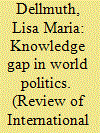

|
|
|
|
|
| Summary/Abstract |
The past decades have seen a significant expansion in the scope and authority of international organisations (IOs), raising questions about who participates and is represented in the public contestation of IOs. An important precondition for citizens to become critically involved in the public debate about an IO is that they are aware of the politics of that IO. This article sheds light on this largely unexplored issue, asking why some citizens are more aware of IOs than others. This question is examined in the context of a powerful international organisation, the United Nations Security Council. Using a multilevel analysis of citizens in 17 Asian and European countries, this article argues that citizen knowledge about the Council is shaped by economic conditions and cosmopolitan identity. Higher levels of knowledge are found among the wealthier, and there is some evidence that income inequality depresses knowledge among poorer citizens. Furthermore, citizens identifying with groups or individuals across nation-state borders are more likely to know more about the Council. The article sketches broader implications for the study of the politicisation of IOs and citizen representation in the public contestation of IOs.
|
|
|
|
|
|
|
|
|
|
|
|
|
|
|
|
| 4 |
ID:
148129


|
|
|
| 5 |
ID:
148132
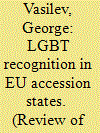

|
|
|
|
|
| Summary/Abstract |
In the EU accession literature, there is a tendency to downplay the role of discourse in facilitating norm diffusion, particularly when domestic resistance towards European norms is strong. The assumptions in this thinking are that critical deliberations and civil society activism simply lack the potency required to elicit norm conforming behaviour in accession states and that the only realistic hope for achieving this rests with the introduction of material incentives that make the costs of normative adaptation lower than its rewards. I focus on developments in the field of LGBT politics to challenge these assumptions and to specify the conditions under which discursive strategies are likely to stimulate the domestic uptake of contentious norms. I highlight shared identity as a crucial factor in the success of discursive influence, contending that under conditions of identity convergence, a cultural environment prevails in which norm promoters can more effectively ignite a process of deliberative reflection, shame norm-violators into conformance and cultivate resonance around controversial ideas. I develop these arguments through an analysis of LGBT and accession politics in Croatia and Serbia, contending that Croatia’s strong identification with Europe accelerated LGBT recognition there while Serbia’s relatively weaker identification with Europe slowed it down.
|
|
|
|
|
|
|
|
|
|
|
|
|
|
|
|
| 6 |
ID:
148130
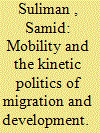

|
|
|
|
|
| Summary/Abstract |
The basic claim of this article is that when the ‘migration-development nexus’ is conceived through a ‘mobilities’ lens, a different account of politics is possible. I refer to this different account of politics as ‘kinetic politics’, to denote that polity formations and political relations are not spatially determined (that is, by processes of boundary formation and relations that travel across these boundaries), but are constituted through movement as people come and go. I argue for a methodological reorientation towards understanding the kinetic politics of development, in order to apprehend the ways in which migrants and migrancy are implicated in the constitution of the polities through which ‘development’ is organised. The recognition of movement as a transversal political relation that cuts across territorial boundaries has implications for the ways in which development is analysed and pursued. I propose that this line of inquiry opens up space to think critically about whether or not formal political membership will remain tethered to problematic territorial and technocratic approaches to ‘sustainable’ development. Might there be space for thinking about migrancy as the basis for rights, and political community as inherently kinetic?
|
|
|
|
|
|
|
|
|
|
|
|
|
|
|
|
| 7 |
ID:
148127


|
|
|
|
|
| Summary/Abstract |
After the ‘CNN effect’ concept was coined two decades ago, it quickly became a popular shorthand to understand media-conflict interactions. Although the connection has probably always been more complex than what was captured in the concept, research needs to be updated in order to better understand the multifaceted contemporary environments of both media and conflict. There are growing numbers and types of media sources, and multiple interactions between media and conflict actors, policymakers and engaged publics from the local to the global and back. We argue that understanding the impact of media reporting on conflict requires a new framework that captures the multilevel and hybrid media environments of contemporary conflicts. This study provides a roadmap of how to systematically unpack this environment. It describes and explains how different levels, interactions, and forms of news reporting shape conflicts and peacebuilding in local, national and regional contexts, and how international responses interact with multiple media narratives. With these tools, comprehensive understandings of contemporary local to global media interactions can be incorporated into new research on media and conflict.
|
|
|
|
|
|
|
|
|
|
|
|
|
|
|
|
| 8 |
ID:
148133
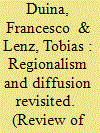

|
|
|
|
|
| Summary/Abstract |
An emerging research programme on diffusion across regional international organisations (RIOs) proposes that decisions taken in one RIO affect decision-making in other RIOs. This work has provided a welcome corrective to endogenously-focused accounts of RIOs. Nevertheless, by focusing on the final design of policies and institutional arrangements, it has been conceptually overly narrow. This has led to a truncated understanding of diffusion’s impact and to an unjustified view of convergence as its primary outcome. Drawing on public policy and sociological research, we offer a conceptual framework that seeks to remedy these weaknesses by disaggregating the decision-making process on the ‘receiving’ side. We suggest that policies and institutional arrangements in RIOs result from three decision-making stages: problematisation (identification of something as a political problem), framing (categorisation of the problem and possible solutions), and scripting (design of final solutions). Diffusion can affect any combination of these stages. Consequently, its effects are more varied and potentially extensive than is currently recognised, and convergence and persistent variation in scripting are both possible outcomes. We illustrate our framework by re-evaluating research on dispute settlement institutions in the EEC, NAFTA, and SADC. We conclude by discussing its theoretical implications and the conditions that likely promote diffusion.
|
|
|
|
|
|
|
|
|
|
|
|
|
|
|
|
| 9 |
ID:
148124
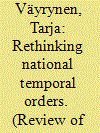

|
|
|
|
|
| Summary/Abstract |
How the past is remembered is fundamental to the production and reproduction of postwar sovereign political power. However, Internation Relations’ (IR) explicit interest in the practices of remembrance, and particularly in time remains a relatively new one. This article seeks to show how Jacques Rancière’s discussion of temporality, subaltern history, and politics – which allows the study of parallel and enmeshing temporal universes – contributes to the IR literature on time. In this view, when speech is acquired by those whose right to speak is not recognised they can produce temporalities that disturb hegemonic representations of time constellations and reorganise the nation’s relationship to its past. The article analyses the moment of Kaisu Lehtimäki’s telling her war story in public, and understands it to be a material and symbolic event that shatters the hegemonic distribution of the Finnish postwar national history and truth.
|
|
|
|
|
|
|
|
|
|
|
|
|
|
|
|
| 10 |
ID:
148125
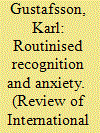

|
|
|
|
|
| Summary/Abstract |
Why do interstate relations deteriorate and become conflictual, even under conditions where one might expect improved ties? The article seeks an answer to this question through a case study of the deterioration in Sino-Japanese relations in the twenty-first century, which took place despite the existence of several factors that might be thought likely to have led to an improvement. Existing theoretical approaches cannot fully explain this puzzle. The article argues that such deteriorations can result from disruptions to states’ reciprocally performed routinised recognition, and identifies three mechanisms through which these can occur. To facilitate this argument, the article draws on scholarship on relational identity, recognition, and ontological security to develop a theory of identity construction that takes account of how self and other routinise the ways in which they recognise each other and how they react to the other’s representational practices.
|
|
|
|
|
|
|
|
|
|
|
|
|
|
|
|
|
|
|
|
|